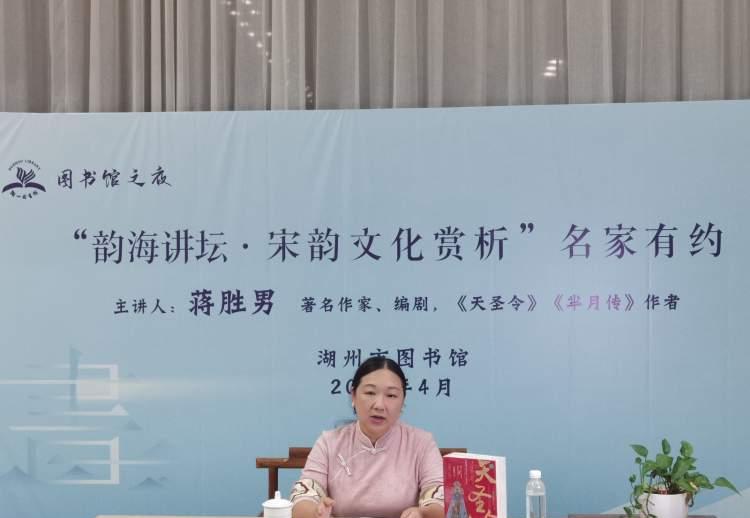On the occasion of World Book Day, Jiang Shengnan, a representative writer of women's big historical novels, visited Huzhou Library and held an online theme lecture entitled "The Beauty of Reading: Appreciation of Song Yun Culture", sharing with readers the song yun cultural elements in his works and the historical choices behind them.

As a famous writer and screenwriter Jiang Shengnan, her creation of "The Legend of Mi Yue" and "Yan Yuntai" can be described as a household name, and the TV series of the same name is a successful case of IP transformation that is deeply rooted in the hearts of the people.
In the past, the interpretation of Song Yun culture was mostly from the perspective of academic or life aesthetics, and the use of long novels to show Song Yun culture can be described as rare, and Jiang Shengnan's new work "Heavenly Holy Order" just makes up for this gap.
Just as Chen Qirong, member of the National Committee of the Chinese People's Political Consultative Conference and former vice chairman of the China Writers Association, said, Jiang Shengnan, by preaching "Heavenly Holy Order," has raised the creation of Chinese online historical themes to a new height of ideological, artistic, ornamental, and network-based unity, and is a new height for online historical theme works to be comparable to traditional historical theme works.
Together with Jiang Shengnan's previously created Yan Yuntai and the iron-blooded Rouge being created, the Heavenly Order is called the "Song Liaoxia Trilogy".
These three works are from the perspective of female politicians, the whole landscape illuminates the three specific historical periods of Song, Liao, and Xia, and slowly unfolds a long picture of history for readers through the heroine's personal struggle experience.
The protagonist of "Heavenly Holy Order" is The Empress Liu E of Song ZhangxianMingsu (the heroine of the legendary Tanuki cat for the prince), with the ups and downs of Liu E's life as the main line, focusing on the political and humanistic historical features of the three dynasties of Taizong, Zhenzong and Renzong in the early years of the Northern Song Dynasty, telling the story of the Song Dynasty from the strife and chaos at the beginning of the founding of the Country, to experiencing the internal struggle for the throne and the integration of the north and the south, and then to the establishment of laws, towards economic prosperity and the happiness of the people.
In traditional society, men basically hold political, economic, cultural and other aspects of power, and women are dependent on power. But women in the Song Dynasty not only had a certain right to education, but also had considerable self-awareness and ability to take responsibility.
Liu E can be said to be the most outstanding representative. It was precisely because of her outstanding talent and wisdom that Song Zhenzong always believed that she loved her, and became empress at the age of forty, and later entrusted the Jiangshan Dynasty, and then had the later Song Renzong Renzheng.
She was not the legendary "adulterous concubine" (a slander of men who hated her), but a politician with great wisdom, so later history highly praised her for having the talents of Lü Hou and Wu Zetian instead of the cruelty of Lü Hou and Wu Zetian.
The name of the book "Heavenly Holy Order" is derived from the era name "Tiansheng" in the early period of Emperor Renzong of Song, which is also the era name of Liu E's reign. "Heaven" can be divided into "two people", that is, "two people are sacred", which is the meaning of the empress dowager and the emperor to jointly carry out the imperial program.
After the founding of the Song Dynasty, it continued to use the Tang Dynasty laws until Liu E came to power, and then issued a new "Heavenly Sacred Order", which made many revisions to the Tang Order, becoming the first code of the Song Dynasty in the true sense, and the earliest surviving code in China.
The political system of the Song Dynasty was first, adhering to the political purpose of "strong cadres and weak branches" and strengthening centralized power, and the other was advocating the political concept of "the emperor and the scholar rule the world together".
This political system ended the chaotic situation in the two hundred years since the Middle and Tang Dynasties, maintained the feudal rule of the two and three hundred years of the Song Dynasty, and also provided a strong political guarantee and institutional support for the great development and prosperity of the Song Dynasty's ideology, scholarship and culture.
History is like a mirror, which can reflect all the confusion and pain of human beings, and also provides a mirror to appreciate the elegance and civilization.